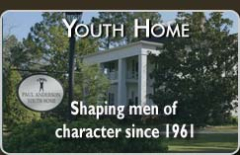 Paul Anderson Youth Home offers fresh start for teens through Holistic, highly successful program
Paul Anderson Youth Home offers fresh start for teens through Holistic, highly successful program
VIDALIA, Ga. – Each week, more than 36,000 teens are arrested. The causes leading to arrest are many – drug use and addiction, rage, pornography,violence, sexual offenses and involvement in abusive relationships to name a few.
Alternatives to jail time include residential treatment programs and today, many short term programs for troubled youth tout declining success rates. In light of the tragedies above, 90 percent of graduates from the Paul Anderson Youth Home (PAYH), built on 53 years of strength and renown, never face jail time again.
According to the Centers for Disease Control (CDC), people who wish to have a successful recovery from addictions should enroll in a program that is at least 90 days in length. In addition, recovery should be viewed as a comprehensive and long-term process, not something to happen quickly or alone.
At the PAYH, where the average length of treatment is 18 months, young men from around the country find freedom from dangerous trends affecting today’s youth. The home provides an alternative to jail time through a comprehensive approach that includes academic training in a SACS accredited high school setting, and incorporating physical fitness, social awareness, work ethic development and emotional and spiritual growth. PAYH serves not only the young men in the program, but encourages and nurtures their families as well.
“We are committed to serving these young men, no matter the cost. If they are the lost generation, then the generation before them is responsible,” said Drew Read, the COO of PAYH. “Our desire is to see them reach their potential as the next generation of husbands, fathers, workers, students, teachers and coaches. The value of these young
men’s lives could never be measured, but the value of our holistic approach to recovery
is evident in our success rate.”
Every young man who enrolls in the PAYH receives a scholarship to cover 83 percent of the program’s costs through the support of individuals, corporations, churches and foundations, leaving only 17 percent ‘tuition’ to be covered, “significantly less than similar programs.”
Founded in 1961 by Olympic gold medalist, world champion weightlifter and Guinness Book of World Records holder, Paul Anderson, and his wife Glenda, the home is a sanctuary for troubled teens and their families.
Though Anderson wowed the world with his feats of strength, even after his death in 1994, his true legacy remains in his lasting impact on the lives of youth as co-founder of the PAYH in Vidalia, Ga. During his life, Anderson not only built alternative homes for otherwise incarcerated young men, but the very first home in Vidalia, Ga., which
continues to shape and launch young men back into society today.
In addition to serving more than 1,200 young men at the PAYH since it’s beginning, through the research compiled at the Paul Anderson Youth Home, the staff is able to monitor dangerous trends on the horizon for today’s youth and young adults and address a generation crying out for help.
Many parents believe their families are exempt from these dangerous trends, yet children are starting to use drugs as early as elementary school. In 2011, the PAYH began offering resources for parents under its familySTRONG umbrella.
FamilySTRONG materials help parents spot warning signs, develop authentic relationships with their children and ask for help if the need arises. Through online articles, conversation starters and parenting conferences, familySTRONG offers instruction, teaching, advice, hope and strength, while discussing issues negatively affecting today’s youth such as: culture, identity, high-risk behaviors, depression, suicide and technology.
Since 1960, the Paul Anderson Youth Home has provided a sanctuary for more than 1,200 troubled young men ages 16-20. Founded as an alternative to juvenile correctional facilities, the program helps young men overcome addiction and unhealthy lifestyle
patterns by placing emphasis on physical work and play, rigorous academics, and
restored relationships with God, their families, and society. The PAYH also equips
families nationally to detect and respond to troubled behavior through familySTRONG
resources and parenting events. To learn more about the PAYH and familySTRONG
resources, visit: http://payh.org.



